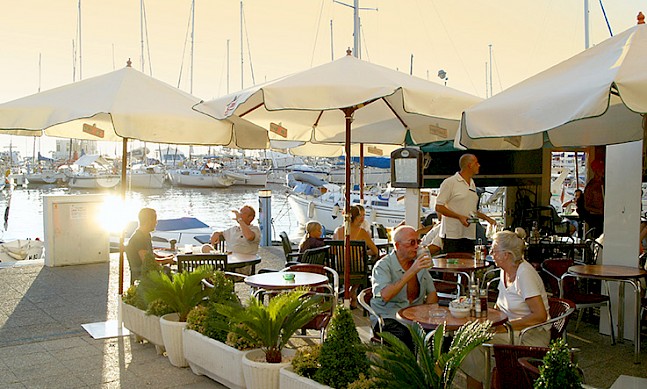
Minister Gilbert Licudi has held ministerial responsibility for education and justice since 2011, and following the most recent general elections has added the international exchange of information to his portfolio. He spoke to The Report Company about his unconventional career path and the importance of a good education in providing a bright future for Gibraltar’s young people.
The Report Company: You left school at 17, married at 19, went into the world of work, and it wasn’t until the age of 28 that you decided to study law and subsequently become a barrister. As education minister, would you recommend your career path to young people?
Gilbert Licudi: It is never too late to go back to studying. In my case, I returned to full-time education 11 years after I had left school. The reason I did that was very simple; I completed part of my education and I just didn’t know what I wanted to do, and I made a conscious decision to leave school until I decided what career path I wanted to take. It was always going to be a temporary pause in my education, but it took 11 years for me to decide.
TRC: What led you to join politics?
GL: After leaving school, I did various bits of work. I lived in London for a little while, then got into politics with the Gibraltar Socialist Labour Party in 1984 at the age of 24. The signing of the Brussels agreement was really the catalyst of my involvement in politics. That was an agreement between the United Kingdom and Spain whereby two foreign nations sat together to decide on our future. I think it’s important to put it in context; we had had a closed frontier situation since the Franco times. It closed completely in 1969, and I was nine at the time. It opened again partially in 1982 for pedestrians only when I was 22, so I lived the whole of my adolescence and formative years through a closed frontier situation. By 1984, we still didn’t have a normalised situation, and we could argue that we’ve never had it since because of periodic issues. After having lived all that, we then saw two countries deciding for themselves that they would sit down and discuss the sovereignty of Gibraltar. I was incensed, as were many Gibraltarians at the time.
The movement against the Brussels agreement started with the Gibraltar Socialist Labour Party. I identified fully with everything that the party and what [former GSLP Chief Minister] Joe Bossano in particular was saying. I was invited to form part of the executive committee of the Gibraltar Socialist Labour Party and since 1984, I’ve been an activist in the party. We were coming up to elections in 1988. We had a government at the time led by Sir Joshua Hassan, but by that time he was coming to the end of his political life and I felt that Gibraltar needed a change. I put my name forward as a possible candidate for the 1988 elections. I wasn’t selected, but by then I’d developed an interest in law, and I chose to then go off and study.
Something very important happened in 1988 which facilitated that, and that was precisely that the GSLP won the elections, came in and changed the rules of entitlement to scholarships. Previously, you had to achieve certain grades and a certain number of points in order to be entitled to a government scholarship. The GSLP changed that and introduced a mandatory scholarship scheme, whereby anybody who had a place in a higher education institution in the UK to study an undergraduate programme would automatically be entitled to a government scholarship. And that is what I did. I took advantage of that new scheme in 1988 and went off to study law. Then I came back and became a barrister and I enjoyed a very good and highly rewarding career with Hassans throughout the period of time that I was there.
TRC: What importance has the government attached to education in the shape of budget allocations?
GL: A great deal of importance. Education is one of the biggest spenders in terms of the budget. Precisely because of my story, I was very conscious that I was given the opportunity of second-chance education through the GSLP, through the changes that were made to the scholarship system and therefore I felt personally that we should proceed to give as many opportunities and chances in education to everyone.
We have made it clear that we were going to give educational opportunities not just to students who were at school but generally across the community. We have expanded on that mandatory scholarship scheme for undergraduate courses, and we decided to invest further into education by extending it to postgraduate courses. That required not only a political commitment but an economic one as well.
TRC: How many students take advantage of the scheme, and what is the cost to the government?
GL: Every year we see increasing numbers of students, the majority going to the United Kingdom. As of this year, the government is funding 866 students through the scholarship scheme. They are studying mostly in UK universities and institutions but also in some European institutions for example in Prague, in Poland, and we’ve got a few students in Malta studying medicine.
Our scholarship system works in such a way that we pay all the tuition fees, we pay a full maintenance grant, we pay flights and train fares, so it’s a very generous scheme. Generally it’s around £16,000 a year with the £9,000 tuition fee in the UK plus the living allowance, per student, but there are some courses that are substantially more expensive. We are talking this year of a budget of around £16 million in scholarships alone as part of the education budget.
The education budget has increased significantly in the last three years for a number of reasons. Firstly, as a matter of policy, we extended the mandatory entitlement to postgraduate students, and therefore we have a number of new students going off and taking advantage of that. The other reason is that the scholarship budget had to necessarily increase as a result of increase in tuition fees in the UK. Whereas previously tuition fees were £3,000 per year, the British government allowed universities to charge up to £9,000. We gave a commitment that, regardless of the level of tuition fees in the UK, we would continue with our mandatory scheme and therefore that would be fully funded by the government. So there has been a significant increase because of that. The other factor is that we have increased substantially the human resources in the department of education. We decided to increase the complement of teachers that was available in our schools.
TRC: Could this funding of overseas study lead to brain drain?
GL: Most of the students come back. Although contractually, students are required to return to Gibraltar and work for the government in return for the scholarship, in practice, everybody that wants to stay away or come back and be employed in the private sector, is allowed to do so. The reality, however, is that the majority of students want to return to Gibraltar.
“The idea of a university in Gibraltar has been spoken about for many years. We decided that the university could be good, not just educationally but for Gibraltar generally. We needed to step up to become a university city”Tweet This
TRC: Your ministry recently launched formal plans for the establishment of the University of Gibraltar. What are your expectations of this project?
GL: The idea of a university in Gibraltar has been spoken about for many years. Successive governments over the years have thought about the concept of Gibraltar having a university. For whatever reason, be it financial or policy or time, nobody actually got to do it. We decided before the 2011 elections, when we were looking at the education offering, that the opening of the university was going to be particularly important. That was again highlighting the priority that we give education and the investment that we were prepared to make. We thought that the university could be good, not just educationally but for Gibraltar generally, from a reputational point of view. We needed to step up to become a university city. And we said that we were going to do it in the first term of office, which was within the first four years. Our term of office comes to an end by December, and we’re going to open the university on the 21st September 2015.
TRC: What courses will the university offer?
GL: There are a number of undergraduate courses, a number of certificates and a number of postgraduate diplomas that are going to be available, with different collaborations. The BSc in nursing, for example, is validated by Kingston University. Our business related degrees are part of the University of London International Programmes. We are also collaborating with Oxford Brookes University on hospitality management. The offering is necessarily going to be a limited because we are going to be a new university. All the courses initially are going to be on a part-time basis, except for the degree in nursing, which is going to be a full-time degree in collaboration with the Gibraltar Health Authority. The fees are competitive and there are different fees for different courses.
The university will not affect the mandatory scholarships scheme. One thing we have made clear is that the opening of the university in no way signals that we want to stop or cut the mandatory scholarship system, whereby students are able to choose which university they go to.
TRC: Do the subjects offered reflect the needs of the economy?
GL: Yes, they do. We have created four faculties: a faculty of business, a faculty of tourism and hospitality, a faculty of health studies and sports science and a faculty of life sciences with Gibraltar and Mediterranean studies. Those four faculties have been chosen specifically because those are all identified with Gibraltar in some way.
We will also be offering ten opportunities for PhD researchers to join the university to generate important research to benefit Gibraltar whether scientifically, as a community or even educationally.
The university is going to be totally independent of government. At the moment it is a government project to set up the university and get it going. The role of the government and of the ministry is going to be limited to making a number of appointments to key positions. Institutional independence and academic freedom are important and are safeguarded under the University of Gibraltar Act. We have also decided that the university should have a language centre to develop not just the teaching of English as a foreign language, but also as a professional language, such as English for engineers or for lawyers. There will therefore be specific courses for different professions.
TRC: Do you foresee the university attracting foreign students?
GL: This is a university that is going to be able to attract foreign students and that is why, as from next year, we expect to have student accommodation ready. We have earmarked a plot of land very near the university campus, where the university accommodation is going to be placed. We are in a unique and attractive location and will be offering higher education opportunities over a wide range of topics in collaboration with established and well known institutions. I have no doubt that we will be able to attract international students to Gibraltar.
TRC: You recently added international information exchange to your ministerial portfolio. How important is this issue to Gibraltar?
GL: It is extremely important. We signed up to the OECD multilateral convention on the exchange of information on tax matters. I attended an OECD conference in South Africa dealing with this area and I made a contribution there in which I made it absolutely clear that Gibraltar subscribed fully to all international standards in terms of exchange of information. We have had meetings with officials in the UK government and our chief minister has had meetings with the prime minister specifically on this issue. We have been collaborating with the UK as part of their drive to increase transparency and facilitate exchange of information.
We have transposed in Gibraltar an EU directive on exchange of information, so apart from over 30 bilateral agreements we have on exchange of information, we’ve also got the directive that applies through the European Union. We comply with international standards, but we expect the international community to apply these standards to all other jurisdictions, large or small, so that we’re all playing by the same rules.
On that basis we certainly feel that Gibraltar can stand on its own two feet. We don’t need to hide behind any agenda or any barriers. We need to be as open as possible. There is plenty of business out there and plenty of things we can offer but we do so in a transparent way and a way that meets Gibraltar’s international obligations fully. We are very proud of being fully up to date in terms of Gibraltar’s EU obligations in the transposition of directives. Every single directive that we have had to transpose into Gibraltar law by a particular date has been done and we keep up to date.
I’m not sure there are many other countries who are able to boast of that record. This shows how important international obligations are to us, and we want to be judged by that. Reputation is key and is absolutely everything for us in Gibraltar.
“We have made it clear that we were going to give educational opportunities not just to students who were at school but generally across the community”Tweet This









